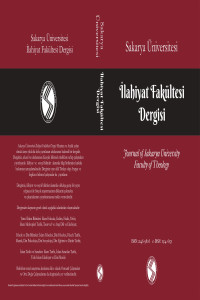Mefhum-i Muhalefet Yönteminin Ayrık Şartlı Kıyasa Evrimindeki Devinim
The Dynamics of the Evolution of Argumentum a Contrario (Mafkhūm al-Mukhālafa) Method into Disjunctive Conditional Syllogism (Al-Sabr wa'l-Taqsim)
Author(s): Mahmud Muhammed ÖzdemirSubject(s): Islam studies
Published by: Sakarya üniversitesi
Keywords: Islamic Legal Methodology; Argumentum a Contrario; Disjunctive Conditional Syllogism; al-Sabr wa'l-Taqsim;
Summary/Abstract: The undeniable merit and central role of Islamic legal methodology in accurately understanding the Qur'an and Sunnah, and in deriving rulings from these sources in line with the will of the Divine Legislator, Almighty Allah, is a well-established fact among the Islamic sciences. This field serves as the foundational framework that guides Islamic jurists in their interpretation and application of religious texts, ensuring that their rulings align with the overarching objectives of Sharia. Due to this irrefutable position within the Islamic sciences, scholars have devoted considerable attention to this discipline. They have developed various schools and methods within this field and have experienced significant differences of opinion regarding the principles and rules established by these schools. These methodological differences often reflect deeper philosophical and theological perspectives that influence how jurists perceive the sources of law and their application. These disagreements have, in turn, influenced the rulings derived from the sources. Islamic legal theorists have placed great emphasis on the meanings of words because the lawgiver’s intent first revealed through language. Consequently, the subject of linguistic indications has occupied a significant place in the foundational works of this science. Detailed discussions have been devoted to topics such as the methods by which words indicate legal rulings, the classification of these indications, their varieties, and examples. These discussions are critical because they directly impact the interpretation of the texts, influencing how jurists derive legal rulings that are meant to be applied in various contexts. Disputes have also arisen in some of these areas. Among the issues related to linguistic indications, the method known as argumentum a contrario has been particularly prominent. The debates surrounding this method have not only necessitated its methodological foundation but have also led to substantial disagreements within Islamic legal methodology and law itself.
Journal: Sakarya Üniversitesi İlahiyat Fakültesi Dergisi (SAUIFD)
- Issue Year: 26/2024
- Issue No: 50
- Page Range: 495-516
- Page Count: 22
- Language: Turkish

